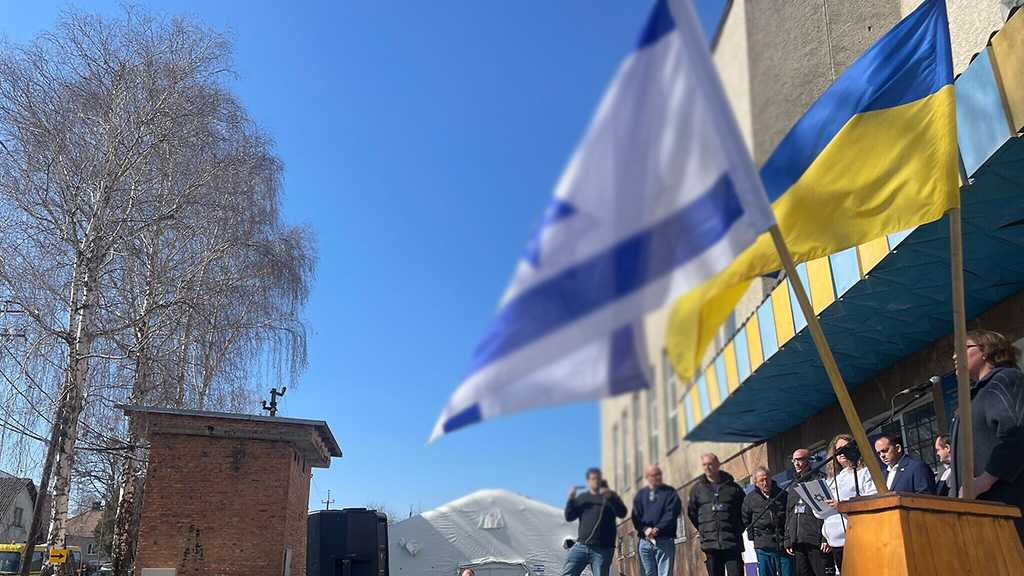AhlulBayt News Agency: Russia has warned that it will take retaliatory measures against the “Israeli” entity in case the Tel Aviv regime supplies Ukraine with military equipment and aid amid the military conflict there.
Bloomberg television news network, citing two unnamed sources familiar with Russian policy, reported that Moscow would respond if the entity passed along missile systems directly or through a third party to Ukraine. The report did not specify what action Russian officials might take.
The Tel Aviv regime seems to be warming to the idea of supplying military equipment to Ukraine.
However, the coming change of administration in the “Israeli”-occupied territories leaves future policy under question. Benjamin Netanyahu, who is expected to form the next “Israeli” cabinet, has been known for his good relations with Russian President Vladimir Putin.
The Bloomberg report follows remarks made by former Russian president Dmitry Medvedev last month, who said the entity would “destroy” all ties with Moscow if Tel Aviv insists on the “very reckless move” of supplying Ukraine with weapons.
The “Israeli” regime’s diaspora affairs minister Nachman Shai said on October 17 that the “time has come for Ukraine to receive military aid” from the “Israeli” entity after repeating the accusation that Iran was sending weapons to Russia, despite the firm rejection of such an allegation by Tehran.
“‘Israel’ seems to be going to supply weapons to the Kiev regime; a very reckless move. It will destroy all interstate relations between” Moscow and Tel Aviv, Medvedev, currently serving as deputy chairman of the Russian Security Council, later wrote in a Telegram post in response, saying that Ukraine is praising “Nazi” heroes.
“If they are supplied with weapons then it is time for ‘Israel’ to declare [Stepan] Bandera and [Roman] Shukhevych their heroes,” the senior Russian politician added, referring to Ukraine’s nationalist leaders of the 1940s and 1950s.
Ukraine’s President Volodymyr Zelensky told Channel 12’s “Uvda” on Tuesday that the “Israeli” entity recently agreed to provide his country with radio systems it had requested in February.
On Sunday, Ukraine’s Ambassador to the “Israeli” entity Yevgen Korniychuk also said there had been progress “on some technical issues” related to military cooperation between Kiev and Tel Aviv, particularly regarding the entity’s offer to provide missile alert technology.
Back in April, then-“Israeli” Foreign Minister Yair Lapid accused Russia of committing war crimes in Ukraine. Moscow hit back, accusing the regime of using Ukraine to “distract” global attention from its aggression against the Palestinians.
Ukraine has been the subject of a Russian military operation since February 24, with Moscow saying that the operation is aimed at “demilitarizing” the eastern Ukrainian region of Donbas.
Ordering the operation, Russian President Vladimir Putin also said the mission was aimed at “defending people who for eight years were suffering persecution and genocide by the Kiev regime.”
Back in 2014, the neighboring regions of Donetsk and Luhansk – which together form the Donbas – declared themselves independent republics, refusing to recognize Ukraine’s Western-backed government. The declaration of independence was ensued by a conflict between the region’s pro-Russian forces and the Ukrainian military.
/129
Bloomberg television news network, citing two unnamed sources familiar with Russian policy, reported that Moscow would respond if the entity passed along missile systems directly or through a third party to Ukraine. The report did not specify what action Russian officials might take.
The Tel Aviv regime seems to be warming to the idea of supplying military equipment to Ukraine.
However, the coming change of administration in the “Israeli”-occupied territories leaves future policy under question. Benjamin Netanyahu, who is expected to form the next “Israeli” cabinet, has been known for his good relations with Russian President Vladimir Putin.
The Bloomberg report follows remarks made by former Russian president Dmitry Medvedev last month, who said the entity would “destroy” all ties with Moscow if Tel Aviv insists on the “very reckless move” of supplying Ukraine with weapons.
The “Israeli” regime’s diaspora affairs minister Nachman Shai said on October 17 that the “time has come for Ukraine to receive military aid” from the “Israeli” entity after repeating the accusation that Iran was sending weapons to Russia, despite the firm rejection of such an allegation by Tehran.
“‘Israel’ seems to be going to supply weapons to the Kiev regime; a very reckless move. It will destroy all interstate relations between” Moscow and Tel Aviv, Medvedev, currently serving as deputy chairman of the Russian Security Council, later wrote in a Telegram post in response, saying that Ukraine is praising “Nazi” heroes.
“If they are supplied with weapons then it is time for ‘Israel’ to declare [Stepan] Bandera and [Roman] Shukhevych their heroes,” the senior Russian politician added, referring to Ukraine’s nationalist leaders of the 1940s and 1950s.
Ukraine’s President Volodymyr Zelensky told Channel 12’s “Uvda” on Tuesday that the “Israeli” entity recently agreed to provide his country with radio systems it had requested in February.
On Sunday, Ukraine’s Ambassador to the “Israeli” entity Yevgen Korniychuk also said there had been progress “on some technical issues” related to military cooperation between Kiev and Tel Aviv, particularly regarding the entity’s offer to provide missile alert technology.
Back in April, then-“Israeli” Foreign Minister Yair Lapid accused Russia of committing war crimes in Ukraine. Moscow hit back, accusing the regime of using Ukraine to “distract” global attention from its aggression against the Palestinians.
Ukraine has been the subject of a Russian military operation since February 24, with Moscow saying that the operation is aimed at “demilitarizing” the eastern Ukrainian region of Donbas.
Ordering the operation, Russian President Vladimir Putin also said the mission was aimed at “defending people who for eight years were suffering persecution and genocide by the Kiev regime.”
Back in 2014, the neighboring regions of Donetsk and Luhansk – which together form the Donbas – declared themselves independent republics, refusing to recognize Ukraine’s Western-backed government. The declaration of independence was ensued by a conflict between the region’s pro-Russian forces and the Ukrainian military.
/129

